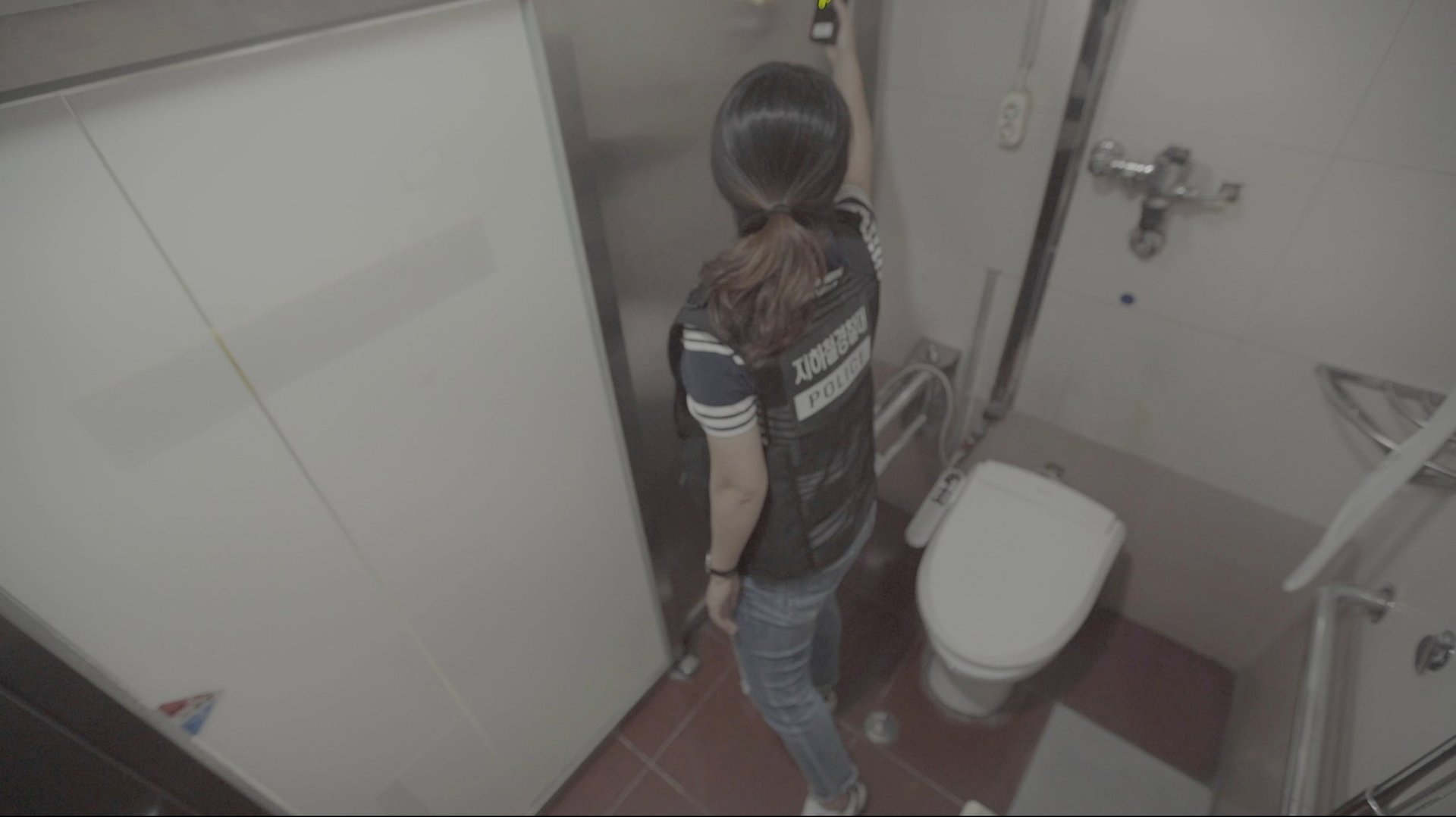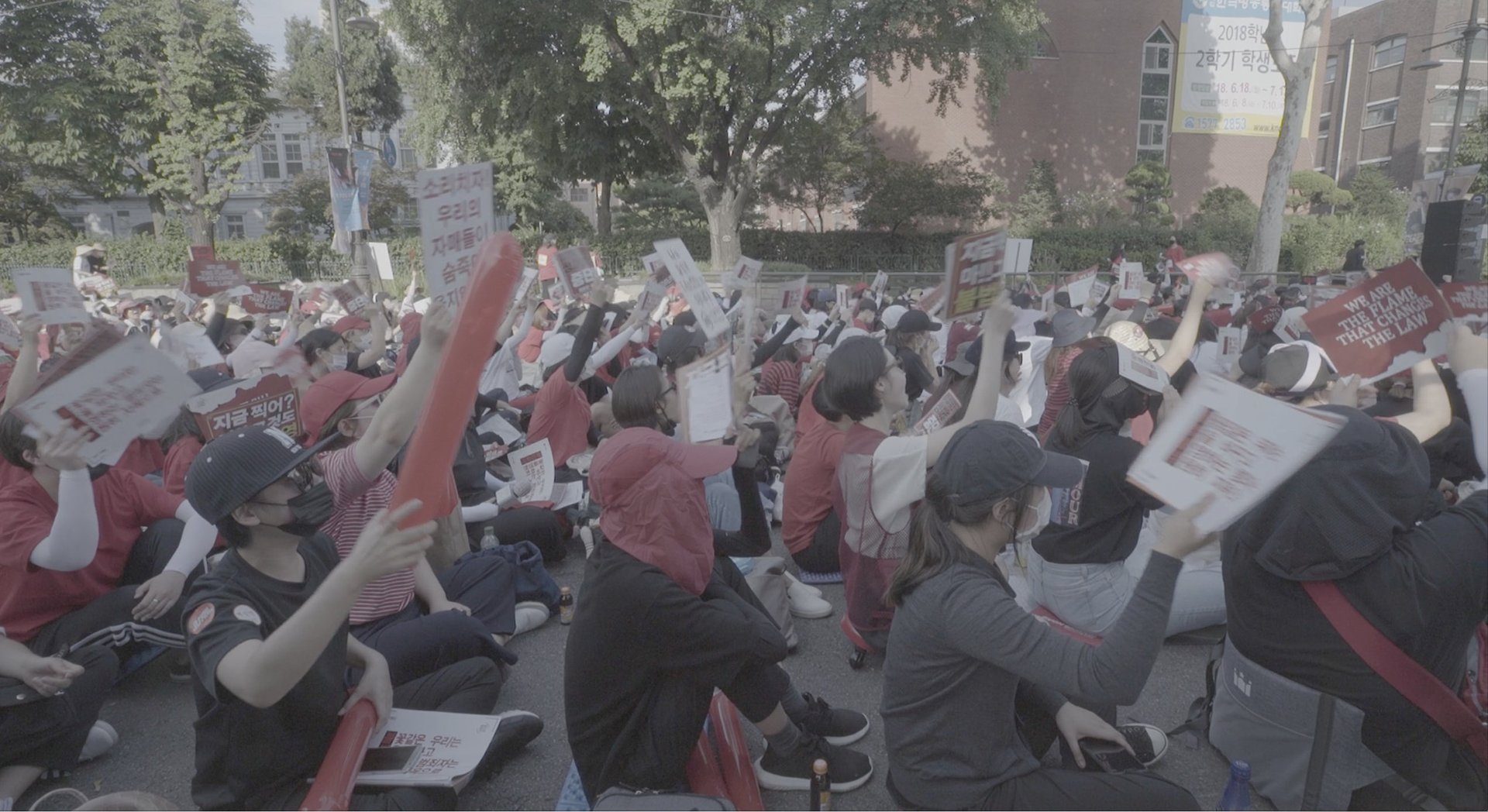South Korean women aren’t safe in public bathrooms—or their homes—because of spy-cam porn
Women are speaking out and taking to the streets in ever greater numbers in South Korea to demand greater equality and protection across a host of issues. Few problems, however, are drawing the kinds of numbers and ire as the country’s long-running spy-camera problem.


Women are speaking out and taking to the streets in ever greater numbers in South Korea to demand greater equality and protection across a host of issues. Few problems, however, are drawing the kinds of numbers and ire as the country’s long-running spy-camera problem.
Since May, tens of thousands of women have turned out on the streets in South Korea to protest against spy cameras (molka) and urge tougher punishment for perpetrators—the biggest-ever women’s protests in South Korea. Footage from these spy cams—which are used to film women surreptitiously in intimate situations, and are often so tiny that they can be hidden inside a door bolt or the tip of a pen—is then uploaded online to websites such as Tumblr.
But women are up against lax penalties for perpetrators and a lack of understanding about the invasive experience of being a victim of spy-cam porn. A recent police campaign (link in Korean) against spy cams in the southern city of Busan, for example, drew criticism for its childish portrayal of spy-cam-wielders as mischievous and playful, perpetuating the “boys will be boys” mindset when it comes to such crimes. The campaign encouraged people to find life-size cutouts of people resembling “man boys,” take photos of them, and upload them to Instagram. A spokesman for the Busan police force said in response “people can have different opinions regarding the campaign—there are positive ones as well.”
Illegal filming was criminalized by South Korea a decade ago. The number of reported cases has increased since then from 1,535 in 2011 to 6,465 in 2017, according to government data. Almost all perpetrators are men—and in the rare exceptions that they are women, some argue that they are judged differently by law enforcement officials.
Double standards
In May, a female model photographed and uploaded a picture of a naked male colleague online without his consent while he was posing in an art class in Hongik University in Seoul. The female perpetrator was swiftly arrested and paraded in front of local media while masked. The police also raided her home for evidence, and inspected a local internet cafe and searched the Han River, as the perpetrator allegedly deleted records on her phone and then discarded her mobile there. She was sentenced yesterday (Aug. 13) to 10 months in prison and 40 hours of therapy on sexual violence.
On the same day, a 29-year old South Korean man received a suspended sentence (link in Korean) of two years for sharing naked photos and footage of his girlfriend online 37 times without her consent.
It was the perceived double standard of how police handle a typical spy-cam porn case compared to the Hongik University case, which involved a female perpetrator, that in part motivated the newly formed group Women March for Justice to organize the protests against spy cams in recent months.

Three women in the group—who wished for all their personal details to remain anonymous out of the fear of doxxing or other retaliation—told Quartz in a recent interview that the perception that the police won’t take a complaint about spy cameras seriously has made many women “numb to the crime.”
In addition to the protests, a petition addressed (link in Korean) to the presidential Blue House demanding that police speed up their investigation of spy-cam crimes drew close to 420,000 signatories. South Korean president Moon Jae-in dubbed such illicit filming a “malicious crime that destroys a woman’s life” and called for more (link in Korean) stringent punishments against perpetrators in May.
“This petition reflects women’s fear towards rampant illegal filming, and their anger towards society which has neglected them and left them to protect themselves from illegal filming,” said one of the members of the group. “This became the motive for the protests. Women who felt strongly about this issue came together and established an internet café” and began organizing the marches.
“What do you want us to do?”
Choi, a female writer in her 20s who only wanted to be identified by her last name, described a recent encounter with the police over a spy-cam voyeur. Late one night in July, a police officer knocked on Choi’s door and handed her a professional camera containing naked photos of her, after a passerby spotted a man taking photos of Choi in her 22nd-floor residence in Seoul from the rooftop of a building separated from Choi’s by a 10-lane road.
Choi said that when she went to the police station the next day as part of the investigation, the police officer who handled her case trivialized the crime repeatedly. “What do you want us to do?” Choi said the police asked her when she expressed fear over not knowing anything about the perpetrator. The man was released within a day, said Choi.
Police did not respond to a request for comment.
In fact, the punishment allowed under the law for spy-camera crimes is not light in Korea, according to Lim Ju-whan, a lawyer in Seoul who specializes in sexual harassment complaints. Offenders face a fine of up to 10 million won ($8,858) or a maximum prison sentence of up to five years. However, only 3% of reported spy-cam perpetrators were detained as of 2016, according to police statistics.
Lim said one of the reasons for the low imprisonment rate is because most of the offenders are students or have “normal” jobs. Perpetrators range from teachers (link in Korean) and civil servants (link in Korean), to a pastor (link in Korean) who installed a camera to spy on his daughter’s friend. That makes the system more lenient towards them, including during the investigation.
“Most perpetrators are students and office workers—usually with family and permanent addresses—which supposedly reduces the chances of them running away,” Lim explained. “Also, spy-cam crimes have high confession rates compared to other crimes. These factors contribute to the low number of people taken into custody.” A perpetrator who confesses is seen as less likely to interfere with an investigation, meaning reduced chances of police issuing an arrest warrant in that case.
Taking matters into one’s own hands
Still, law enforcement officials haven’t exactly been sitting idle. Police conduct regular sweeps of public bathrooms and changing rooms with spy-camera detectors, for example, which cost on average (link in Korean) some 300,000 won ($266), according to local media reports. Female police thoroughly search every nook and cranny, including screws and other suspicious holes on toilet doors, key holes and shower heads.
A recent such police search witnessed by Quartz at Seoul’s Sindaebangsamgeori subway station, however, yielded no results. The two female police officers on the search, Kim So-young and Ji Ha Neul-bom, said that they hadn’t found any cameras in subway stations since they started sweeping for them this year.
Seoul’s government searched around 106,000 public toilets from August 2016 to March 2018 but no hidden cameras were found, according to Goh Gwang-hyun, a Seoul city official in charge of women’s welfare policies. “Spy-cam crimes take place more in privately owned spaces but many women are scared of using public toilets,” said Goh. “Our goal is to make public toilets safe for women.”
The task is particularly challenging for police sweeping public places as many perpetrators allegedly install (link in Korean) the cameras only for a brief period of time before taking off with the footage. Some men enter the toilet dressed as women (link in Korean). And sometimes, the enemy is even within—a subway station employee was caught filming (link in Korean) a woman inside a bathroom in 2016.
In response, women have turned to protecting themselves. Many women inspect public bathrooms for hidden cameras when they use them. And as hidden cameras become ever more sophisticated and minuscule, women are using “Molka emergency kits” (link in Korean) to scan door bolts, glasses, shoes, and other items. The kit contains a mask, a screwdriver, silicon gel, and stickers. The mask protects the woman’s identity, the screwdriver is used to break cameras hidden inside screws, while the silicon gel can block the holes. The kit has been available for sale since February on Tumblbug (link in Korean), a crowdfunding website, and prices range from 10,000 won to 20,000 won ($8 to $17). The seller stated that her fearful experience of running into a man coming out of a public female bathroom led her to develop the kit.
Even when caught red-handed, it’s still difficult to nail down perpetrators. The law stipulates that pictures and videos must induce sexual desire or humiliation to be considered criminal, and critics say that inconsistent interpretations of the law abound. Some cases are rejected by police, they say, because they aren’t deemed ”obscene” enough based on the law.
For that reason, Choi, the woman who was filmed inside her apartment, said she was actually “relieved” that she was naked in the footage. “If I had not been naked in the video, the police might not have considered it a crime worth investigating,” she said.
Zoe Kim contributed reporting.